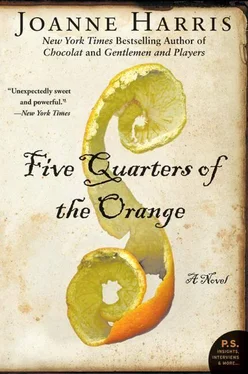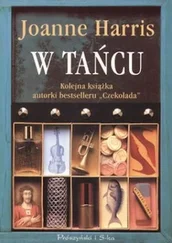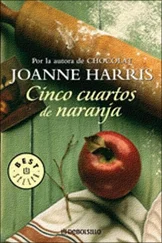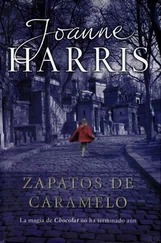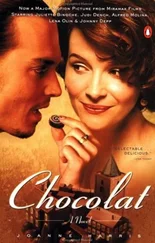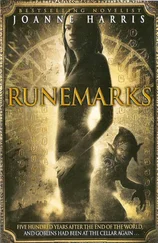Even so, it took some time for me to be accepted. People were polite but unwelcoming, and because I am not of a naturally social disposition-surly, my mother used to call it-they remained so. I did not go to church. I know how it must have looked, but I could not bring myself to go. Arrogance, perhaps, or the kind of defiance that led my mother to name us after fruit rather than the Church’s saints… It took the shop to make me a part of the community.
It began as a shop, though I had always intended to expand later. Three years after my arrival, and Hervé‘s money was almost gone. The house was livable now, though the land was still virtually useless: a dozen trees, a vegetable patch, two pygmy goats and some chickens and ducks-clearly it would be some time before I could make a living from the land. I began to make cakes and to sell them-the brioche and pain d’épices of the region as well as some of my mother’s Breton specialties, packets of crêpes dentelle , fruit tarts and packs of sablés , biscuits, nut bread, cinnamon snaps… At first I sold them from the local bakery, then from the farm itself, adding other items little by little: eggs, goat’s cheeses, fruit liqueurs and wines. With the profits I bought pigs, rabbits, more goats. I used my mother’s old recipes, working most often from memory, but consulting the album from time to time.
Memory plays such strange games; no one in Les Laveuses seemed even to remember my mother’s cooking. Some of the older people even said what a difference my presence had made; the woman who was here before was a hard-faced sloven. Her house reeked, her children ran barefoot. Good riddance to her, to them. I winced inwardly but said nothing. What could I have said? That she waxed the floorboards every day, made us wear felt over-slippers in the house so that our shoes would not scuff the floor? That her window boxes were always brimming with flowers? That she scrubbed us with the same fierce impartiality with which she scrubbed the steps, Indian-burning our faces with the flannel so that we were sometimes afraid we might bleed?
She is an evil legend here. There was even a book once. Not more than a pamphlet really. Fifty pages, a few photographs. One of the memorial, one of Saint-Benedict’s, a close-up of the fateful west wall. Only a passing reference to the three of us, not even our names. I was grateful for that. A blurry blown-up photograph of my mother, hair scraped back so fiercely from her face that her eyes looked chinesed, mouth crimped into a tight little line of disapproval. The official photograph of my father, the one from the album, in uniform, looking absurdly young, rifle slung casually over one arm, grinning. Then, almost at the end of the book, the photograph that made me catch my breath like a fish with a hook in its throat. Four young men in German uniforms, arms linked except for the fourth, standing a little to the side, self-consciously, a saxophone in one hand… The others are also carrying musical instruments-a trumpet, a side drum, a clarinet-and though their names are not given, I know them all. Les Laveuses military ensemble, circa 1942. Far right, Tomas Leibniz .
It took me some time to understand how they could have found out so many details. Where had they discovered the picture of my mother? As far as I knew there were no pictures of her. Even I had only ever seen one, an old wedding photo in the bottom of a bedroom drawer, two people on the steps of Saint-Benedict’s, he wearing a broad-brimmed hat and she loose-haired and with a flower behind one ear… A different woman, then, smiling stiffly, shyly at the camera, the man beside her standing with one arm protectively around her shoulders. I understood that if my mother knew I had seen the photograph she would be angry, and replaced it, trembling a little, troubled almost without knowing the reason why.
The photograph in the book is more like her, more like the woman I thought I knew but never knew at all, hard-faced and eternally on the brink of rage… Then, looking at the author’s picture on the flyleaf of the book, I finally understood from where the information had come. Laure Dessanges, journalist and food writer, short red hair and practiced smile. Yannick’s wife. Cassis’s daughter-in-law. Poor, stupid Cassis. Poor blind Cassis, blinded by his pride in his successful son. Risking our undoing for the sake of…what? Or had he really come to believe his fiction?
You have to understand that for us the Occupation was a very different matter than for those in the towns and the cities. Les Laveuses has barely changed since the war. Look at it now: a handful of streets, some still no more than broad dirt roads, reaching out from a main crossroads. There’s the church at the back, there, the monument in the Place des Martyrs with its bit of garden and the old fountain behind it, then on the Rue Martin et Jean-Marie Dupré, the post office, Petit’s butcher’s, the Café de la Mauvaise Réputation, the bar-tabac with its rack of postcards of the war memorial and old Brassaud sitting in his rocker by the step, the florist-funeral director opposite (food and death, always good trade in Les Laveuses), the general store-still run by the Truriand family, though fortunately a young grandson who only moved back recently-the old yellow-painted postbox.
Beyond the main street runs the Loire, smooth and brown as a sunning snake and broad as a wheat field, its surface broken in irregular patches by islands and sandbanks, which to the tourists driving by on the way to Angers might look as solid as the road beneath them. Of course, we know otherwise. The islands are moving all the time, rootless. Insidiously propelled by the movements of the brown water beneath, they sink and surface like slow yellow whales, leaving small eddies in their wake, harmless enough when seen from a boat, but deadly for a swimmer, the undertow pulling mercilessly beneath the smooth surface, dragging the unwary down to choke undramatically, invisibly… There are still fish in the old Loire, tench and pike and eels grown to monstrous proportions on sewage and the rotting stuff of upriver. Most days you’ll see boats out there, though half the time the fishermen throw back what they catch.
By the old jetty, Paul Hourias has a shack from which he sells bait and fishing tackle, not spitting distance away from where we used to fish, he and Cassis and I, and where Jeannette Gaudin was bitten by the water snake. Paul’s old dog lies at his feet, eerily like the brown mongrel that was his constant companion in the old days, and he watches the river, dangling a piece of string into the water as if he hopes to catch something.
I wonder if he remembers. Sometimes I see him looking at me-he’s one of my regulars-and I could almost think that he does. He’s aged, of course-so have we all. His moony, round face has darkened, grown pouchy and mournful. A limp mustache the color of chewed tobacco. A cigarette end between his teeth. He seldom speaks-he never was talkative-but he watches with that sad-dog expression, a navy beret crammed over his skull. He likes my pancakes, my cider. Perhaps that’s why he never said anything. He was never one to cause a scene.
Ihad been back for almost six years when I opened the crêperie . By then I had money set aside, custom, acceptance. I had a boy working for me on the farm-a boy from Courlé, not from one of the Families-and I took on a girl to help with the service. I started with only five tables-the trick has always been to think small at first, to avoid alarming people-but eventually I had double that, plus what I could fit on the terrasse in front on fine days. I kept it simple. My menu was limited to buckwheat pancakes with a choice of fillings, plus one main dish every day and a selection of desserts. That way I could handle the cooking myself, leaving Lise to take the orders. I called the place Crêpe Framboise after the house specialty, a sweet pancake with raspberry coulis and my homemade liqueur, and I smiled a little to myself, thinking of their reaction if they could have known… Several of my regulars even came to calling the place Chez Framboise, which made me smile all the more.
Читать дальше
